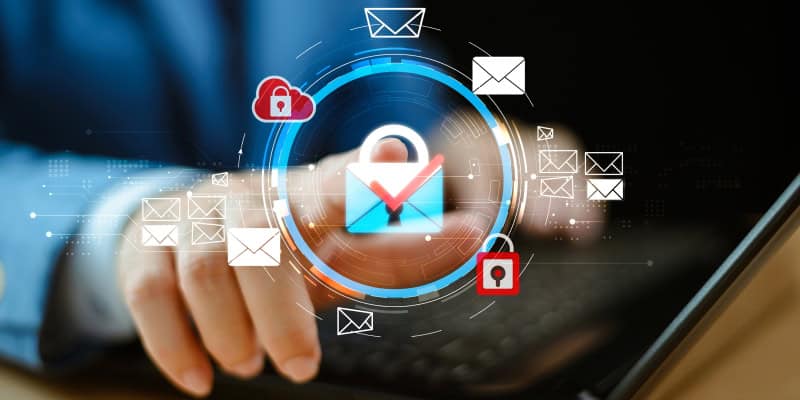Email is an essential tool for business transactions in today’s digital age, but it has also become a prime target for cybercriminals. It sits at the intersection of convenience and vulnerability, where sophisticated phishing schemes and ransomware attacks wait to exploit a single careless click. Recognizing these risks and adopting proactive, informed measures, with guidance from reliable cybersecurity consulting services, is crucial to safeguarding your financial health and preserving trust. Below, we explore the seven most significant email security threats and the steps you can take to protect your business.
Top 7 Email Security Threats for Small Businesses & Ways to Tackle It
Originally designed without stringent security features, email vulnerabilities, exacerbated by the simplicity of SMTP protocols, expose small businesses to a wide array of cyber threats:
1. Human Error Vulnerabilities
Human error remains one of the most significant contributors to email-based security breaches. A single click on a malicious link or a compromised attachment can trigger data breaches, financial losses, and reputational harm. These incidents often highlight a critical gap in employee awareness and training, emphasizing the need for comprehensive educational initiatives.
To reduce vulnerabilities, businesses must prioritize raising staff awareness about phishing tactics, secure email practices, and methods to identify suspicious emails. Implementing robust security measures, such as multi-factor authentication and secure email gateways, provides additional protection, safeguarding your organization against evolving threats.
2. Phishing Attacks
Phishing attacks involve cybercriminals sending fake emails that mimic reputable entities to steal sensitive information. Between 2016 and 2021, phishing complaints surged by an alarming 1,100%, resulting in over $2 billion in losses in the U.S. alone, according to the FBI.
With technological advancements, especially generative AI, phishing tactics have become increasingly sophisticated. Cybercriminals can now craft compelling emails, making distinguishing between legitimate and fraudulent messages difficult. This technological edge has significantly increased the success rate of phishing scams, posing a substantial risk to small businesses.
The consequences of phishing go beyond financial losses, often causing lasting damage to a company’s reputation. High-profile incidents, such as the multimillion-dollar losses suffered by Crelan Bank and Ubiquiti Networks, highlight the devastating impact these attacks can have.
To strengthen your defenses against phishing:
- Carefully examine the sender’s details.
- Stay vigilant with emails requesting personal or financial information.
- Encourage your team to verify the authenticity of emails before responding.
3. Ransomware Attacks
Ransomware attacks delivered via email are an escalating threat. These attacks encrypt victims’ files and demand a ransom, often in cryptocurrency, to restore access. Their sophistication, often involving legitimate-looking emails, is particularly alarming. A single click on a malicious attachment or link can trigger file encryption, leading to severe consequences such as data loss, financial costs to pay ransoms, and prolonged downtime.
The infamous Petya ransomware incident, which spread through malicious email attachments, highlights the devastating impact ransomware can have on businesses. This attack caused widespread disruption and significant financial harm, underscoring the urgency of proactive defenses.
To mitigate ransomware risks, consider these key strategies:
- Implement a multi-layered security framework.
- Regularly update all software with the latest security patches.
- Provide comprehensive staff training on identifying risks and adopting safe practices.
- Maintain regular data backups.
4. Business Email Compromise (BEC) Scams
Business Email Compromise (BEC) scams pose a significant threat to businesses by impersonating executives or trusted partners. Unlike traditional attacks, BEC scams do not rely on malicious links or files, making them exceptionally difficult to detect. Instead, they use thorough research and social engineering to craft emails that appear legitimate, often leading to unexpected financial and operational losses.
The financial impact of BEC scams can be devastating, with substantial losses sometimes uncovered only after the damage is done. These scams exploit organizational trust and bypass technical security measures by preying on human vulnerabilities.
Combatting BEC is particularly challenging due to its reliance on social engineering. This highlights the critical importance of training and awareness programs to equip employees with the knowledge to identify and respond to potential threats.
To minimize the risks associated with BEC:
- Verify any unusual requests for money transfers or sensitive information, particularly those that deviate from standard procedures.
- Implement multi-factor authentication and establish clear verification protocols to prevent unauthorized actions.
Also Read: What Is Cloud Email Security & How Does It Benefit Businesses?
5. Data Leakage
Data leakage, the unauthorized transmission of sensitive information to external recipients, presents a serious threat to businesses.
Employee errors are a leading cause of data breaches in small businesses. Many incidents occur when staff inadvertently send sensitive data to the wrong recipients or fall victim to phishing scams. The fallout from such breaches can be severe, including the loss of sensitive customer data, financial damages, reputational harm, and potential legal issues. Compliance violations resulting from inadequate adherence to strict data protection laws can also lead to significant fines and penalties.
Implementing secure data handling practices is essential to mitigating these risks. Encryption is a key strategy, ensuring that intercepted data remains unreadable to unauthorized recipients. Access controls and regular employee training on data security protocols further strengthen defenses.
Adopting secure email practices is crucial for maintaining customer trust and ensuring the long-term success of your business. A proactive approach to data protection can safeguard your organization from costly and damaging data leaks.
6. Domain Squatting
Domain squatting, or cybersquatting, occurs when individuals register domain names resembling your business or well-known brands. By exploiting brand reputation, these domains are often used to mislead customers, divert traffic, or facilitate phishing attacks.
Protecting your business from domain squatting requires proactive monitoring. Consider registering variations of your domain name, including common misspellings and different top-level domains. This approach prevents bad actors from exploiting your brand. Additionally, leveraging tools to detect and address potential misuse can safeguard your business against such deceptive practices.
7. Email Spoofing
Email spoofing involves attackers creating authentic-looking emails that mimic trusted senders. These emails are often deployed in phishing or Business Email Compromise (BEC) scams, tricking recipients into revealing sensitive information or authorizing financial transactions.
To mitigate the risk of email spoofing, implement robust email authentication protocols like SPF (Sender Policy Framework), DKIM (DomainKeys Identified Mail), and DMARC (Domain-based Message Authentication, Reporting, and Conformance). These measures ensure emails claiming to originate from your domain are legitimate, protecting your business and customers from fraud.
Strengthen Your Defenses Against Email Security Threats
Email security is essential for safeguarding your small business’s integrity and trust. Understanding potential threats and implementing robust security measures are critical steps in defending against increasingly sophisticated cyberattacks. As technology advances, so do cybercriminals’ tactics, making it vital to stay informed about emerging threats and effective solutions.
CMIT Solutions, Mesa & Gilbert, provides expert IT support and cybersecurity services to help your business navigate the evolving digital landscape. We are the IT consulting company you can rely on to protect your business from email security threats and ensure your operations remain secure. Contact us today!
Our IT Services
| Managed IT Services | Cybersecurity | Productivity Applications |
| IT Support | Cloud Services | Network Management |
| Compliance | Data Backup | Unified Communications |
| IT Guidance | IT Procurement |



